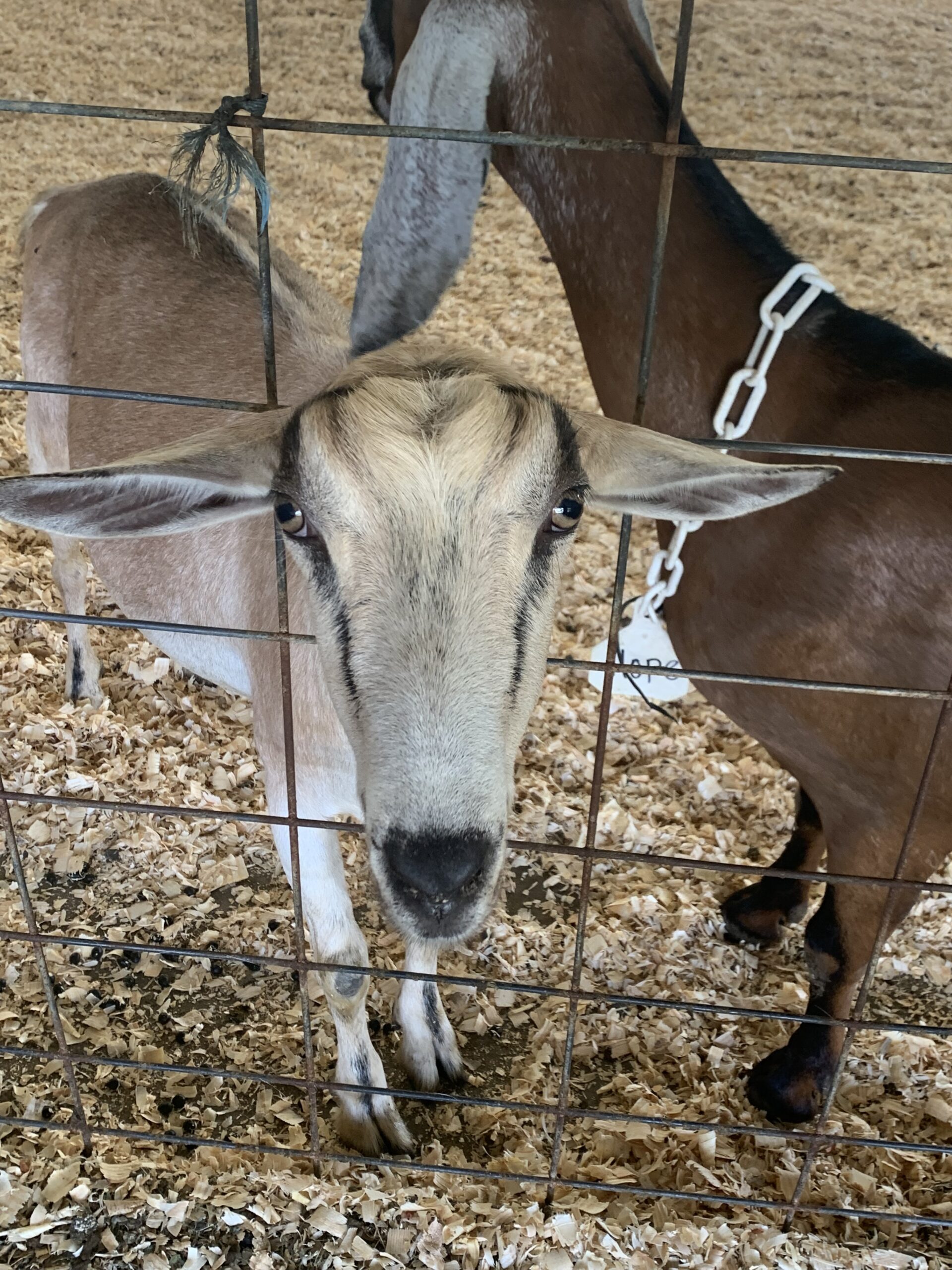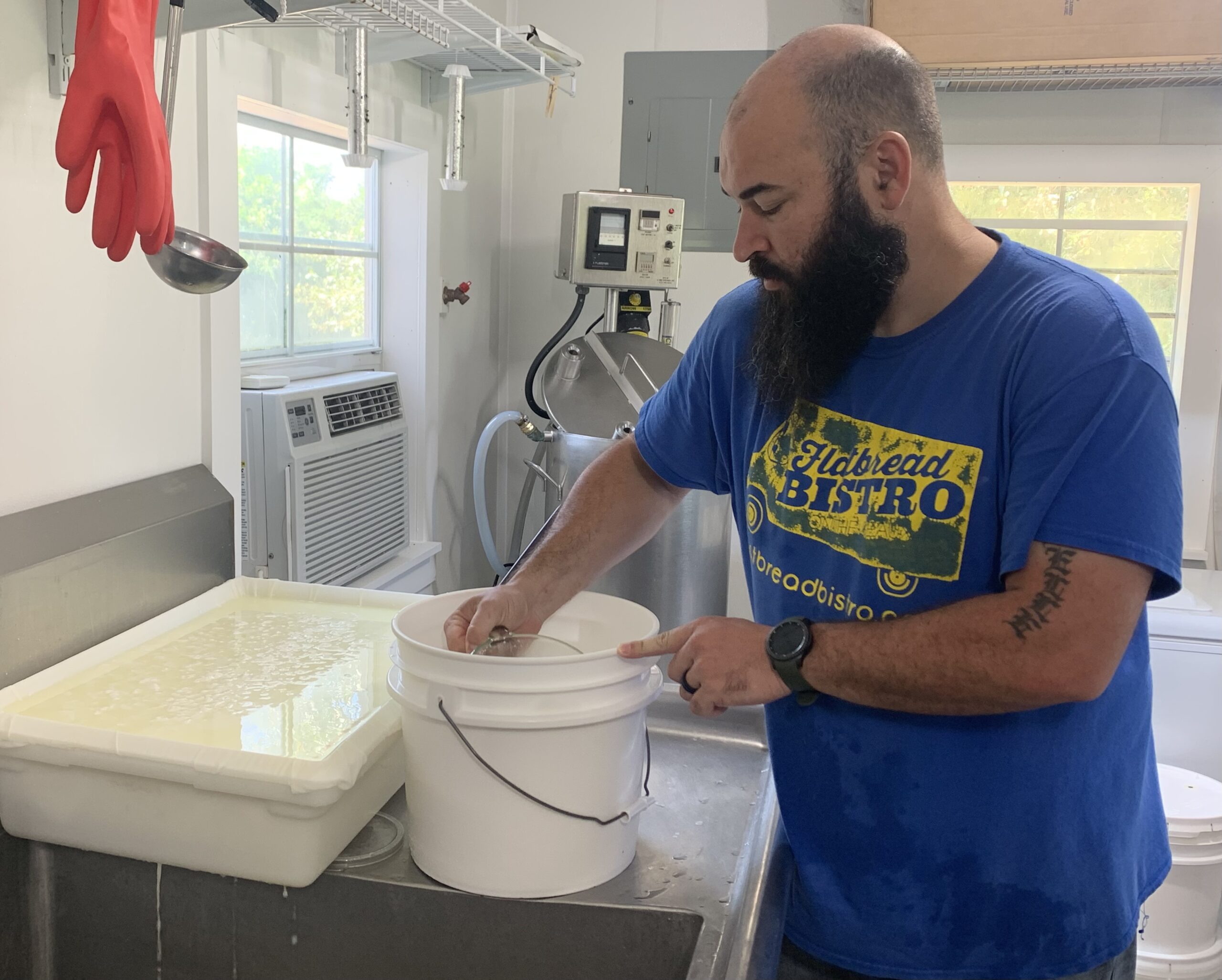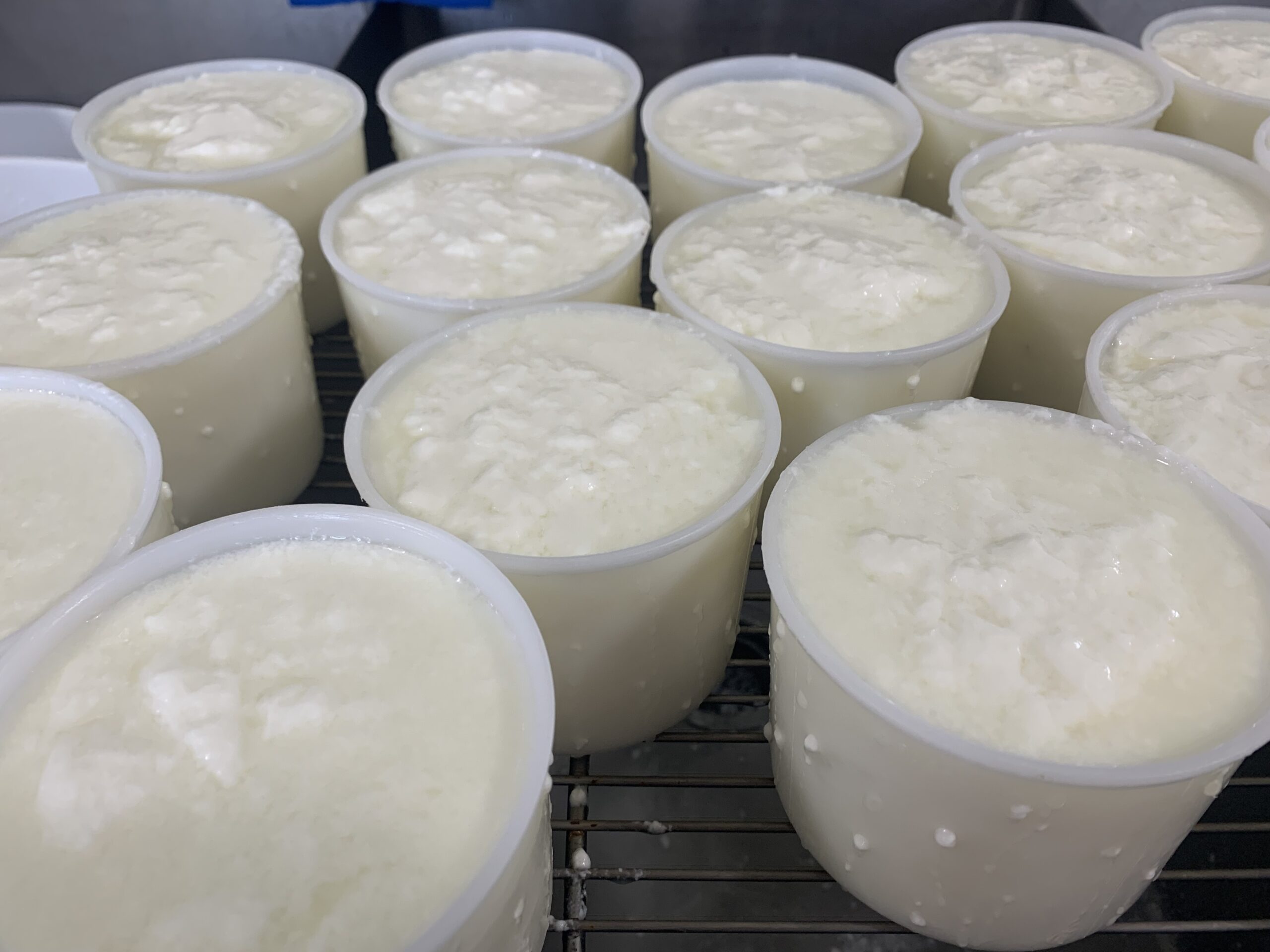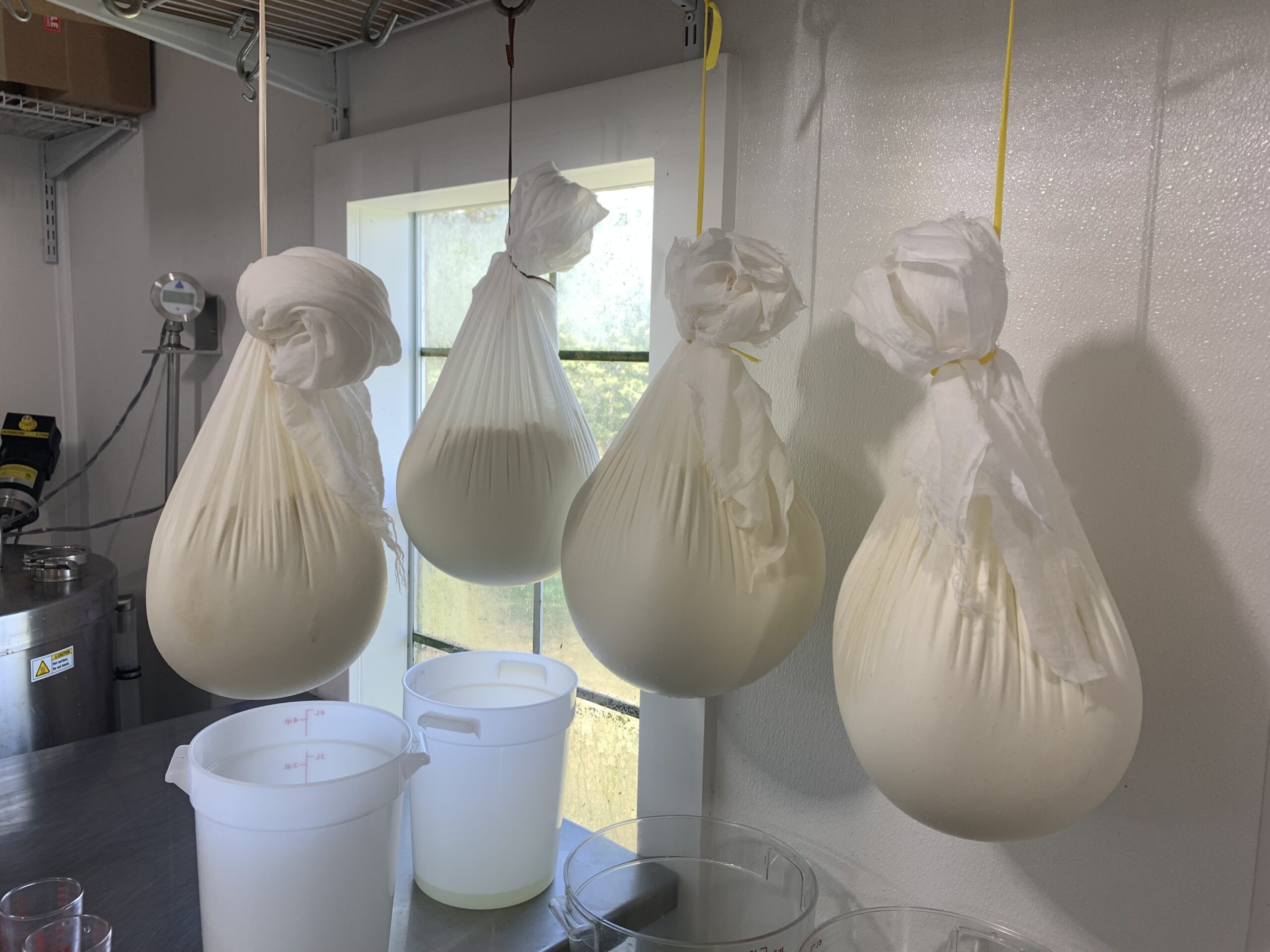Like clockwork, the goats on Nathan and Erin Miller’s Franklinton dairy farm line up for milking twice a day. A mixture of Nubian, Saanen and Alpine breeds, most wear a plastic neck tag bearing a handwritten name. “Their names are all inspired by Southern culture,” Nathan says. And on cue, a duo named Tupelo Honey and Amarillo in the Morning stroll up to give us a sniff.
The Millers’ Circle M Farms, about 100 miles northwest of Baton Rouge in rural Washington Parish, currently keeps 83 goats, most of which are milked for the couple’s growing Southern Maids Dairy. Launched last November, the family-run business sells pasteurized goat’s milk along with chevre, yogurt, several types of feta, cheesecakes and seasonal eggnog. Nathan is a regular at the Thursday and Saturday Red Stick Farmers Markets. The dairy also sells cheese and yogurt to dozens of restaurants in New Orleans through St. James Cheese Company, and to City Group Hospitality restaurant group in Baton Rouge.
In May, Southern Maids began playing around with Creole cream cheese, a fresh, mild unripened cheese with a long and complicated history in Louisiana. At the moment, Southern Maids is the only farm that makes Creole cream cheese with goat’s milk, and is only one of two now selling it in greater Baton Rouge. The other is Feliciana’s Best Creamery, also a Red Stick Farmers Market vendor.
|
|
|


“Reception has been good,” Nathan says. “People remember it, or I’ll hand them a sample and they like it. One lady was telling me how she likes to put it on her cheeseboards.”
To some consumers, Creole cream cheese is a welcome nostalgia food they remember eating as kids with fresh fruit and a sprinkle of sugar or spread on toast with salt and pepper. To others, it’s a completely new experience. If you’ve never tried it, the consistency is firmer than Greek yogurt, but softer than commercial cream cheese. It springs from Old World cheesemaking traditions in which dairy farmers made unripened cheese as a quick and thrifty means of using raw milk. French and German immigrants brought the practice to Louisiana in the 18th and 19th centuries. Generations of their descendants made it routinely.
By the 20th century, Creole cream cheese was also made commercially, especially in and around New Orleans by popular dairies like Gold Seal and Borden.
“When we would get it as kids, it was always a real treat,” says Nathan’s mother-in-law, Mary Ann Logreco, who grew up in greater New Orleans. “We’d put sugar on it and have it with toast. You’d dip the toast in it.”
Logreco says her 87-year-old cousin still makes it today, and now sometimes uses Southern Maids’ fresh goat milk.

By the 1980s, things began to change for the state’s dairies—and for commercial Creole cream cheese. Many dairies were gobbled up by larger national companies, and those that remained faced stricter federal regulations concerning producing value added items. Commercial Creole cream cheese became practically non-existent.
Then in 1999, New Orleans culinary historian and cookbook author Poppy Tooker began rallying for Creole cream cheese’s comeback by teaching people to make it at home. She also kept the topic alive in the media, which wasn’t hard to do. Enthusiasm for local foods and farmers markets was taking root, and soon, a handful of boutique manufacturers, including a few small farms and Chef John Folse, were trying their hand at making it.
But for a variety of reasons, almost all have since ceased operations, making Southern Maids’ entry into this hyper-local, niche market all the more significant.

Earlier this week, I made the nearly two-hour trek to Circle M Farms, traveling on Interstates 12 and 55, then meandering along rolling countryside dotted with convenience stores, cemeteries and campaign election signs. Nathan is originally from Franklinton, although he grew up partly in Lafayette and Baton Rouge, thanks to his father’s career as a Baptist preacher. Today, both he and Erin and their two young sons live on more than 80 acres, but the dairy business isn’t their sole pursuit. Erin works in banking on the Northshore. And while Nathan is the dairy’s public face, he also works several days a week hauling freight in his own big rig.
Once I’ve broken away from the irresistibly cute goats, we head for the cheese production room. There, I watch as Nathan and Southern Maids cheesemaker Kevin Hocke, a former Northshore chef, produce Creole cream cheese for this Saturday’s Red Stick Farmers Market. Hocke is also busy making feta and yogurt.
The Creole cream cheese-making process had begun the day before when Nathan combined fresh goat’s milk with rennet and buttermilk culture in a three-gallon bucket. The mixture sat overnight in the production room, where it began to separate into solid curds and liquid whey.

Nathan carefully lifted small scoops of the now jiggly curds from the bucket and dropped them into 16-ounce plastic containers resembling small colanders. Perforated by holes on the sides and bottom, the special containers allow the curds to keep draining slowly until they reach a soft, spreadable consistency. This is the same manner that both home cooks and small dairies have historically made Creole cream cheese. I watched as Nathan then placed the containers onto large aluminum trays to be refrigerated for 48 hours, during which they’ll continue to drain and reduce to a flan-like consistency. Then, the cheese will be weighed into 8-ounce tubs and readied for market.
While its use may seem mysterious, Creole cream cheese is tasty and versatile. Softly tart, it’s great for spreading on crackers or slices of baguette. It’s delicious plain, but there’s no reason you couldn’t doozy it up with salt, fresh or dried herbs and garlic. Use it as you would regular cream cheese or something like chevre or boursin. Stuff celery or endive with it, topped with cranberries and chopped nuts. Use it to make cheesecake. Or, eat if for breakfast with fresh fruit and honey. Nathan’s favorite way is plain with the addition of a little heavy cream that he buys from fellow vendor Feliciana’s Best at the Saturday Red Stick Farmers Market.
Southern Maids’ goat’s milk products may be soon joined by farmstead fresh mozzarella and burrata, the ever-energetic Nathan says. The farm is home to nine water buffalo, and it’s Nathan’s intention to continue growing the herd and begin producing buffalo milk cheese soon.
|
|
|
“We have the equipment in place, since most of the dairy equipment is already built for cattle, and we’ve changed things to work with goats,” he says.
That’ll be something to try.
For updates, visit the farm’s Facebook page.





